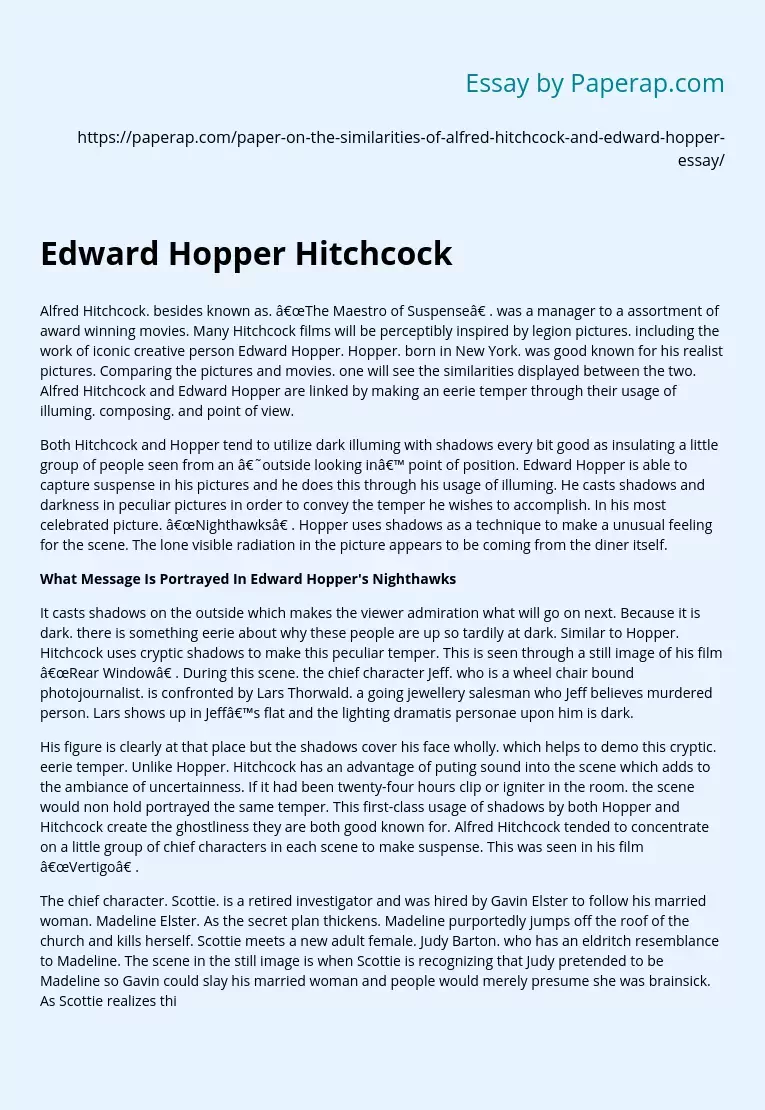What Message Is Portrayed In Edward Hopper's Nighthawks
Alfred Hitchcock. besides known as. “The Maestro of Suspense” . was a manager to a assortment of award winning movies. Many Hitchcock films will be perceptibly inspired by legion pictures. including the work of iconic creative person Edward Hopper. Hopper. born in New York. was good known for his realist pictures. Comparing the pictures and movies. one will see the similarities displayed between the two. Alfred Hitchcock and Edward Hopper are linked by making an eerie temper through their usage of illuming.
composing. and point of view.
Both Hitchcock and Hopper tend to utilize dark illuming with shadows every bit good as insulating a little group of people seen from an ‘outside looking in’ point of position. Edward Hopper is able to capture suspense in his pictures and he does this through his usage of illuming. He casts shadows and darkness in peculiar pictures in order to convey the temper he wishes to accomplish. In his most celebrated picture. “Nighthawks” . Hopper uses shadows as a technique to make a unusual feeling for the scene.
The lone visible radiation in the picture appears to be coming from the diner itself.
It casts shadows on the outside which makes the viewer admiration what will go on next. Because it is dark. there is something eerie about why these people are up so tardily at dark. Similar to Hopper. Hitchcock uses cryptic shadows to make this peculiar temper. This is seen through a still image of his film “Rear Window” . During this scene. the chief character Jeff.
who is a wheel chair bound photojournalist. is confronted by Lars Thorwald. a going jewellery salesman who Jeff believes murdered person. Lars shows up in Jeff’s flat and the lighting dramatis personae upon him is dark.
His figure is clearly at that place but the shadows cover his face wholly. which helps to demo this cryptic. eerie temper. Unlike Hopper. Hitchcock has an advantage of puting sound into the scene which adds to the ambiance of uncertainness. If it had been twenty-four hours clip or igniter in the room. the scene would non hold portrayed the same temper. This first-class usage of shadows by both Hopper and Hitchcock create the ghostliness they are both good known for. Alfred Hitchcock tended to concentrate on a little group of chief characters in each scene to make suspense. This was seen in his film “Vertigo” .
The chief character. Scottie. is a retired investigator and was hired by Gavin Elster to follow his married woman. Madeline Elster. As the secret plan thickens. Madeline purportedly jumps off the roof of the church and kills herself. Scottie meets a new adult female. Judy Barton. who has an eldritch resemblance to Madeline. The scene in the still image is when Scottie is recognizing that Judy pretended to be Madeline so Gavin could slay his married woman and people would merely presume she was brainsick. As Scottie realizes this. the camera position is focused on merely him. By insulating him entirely. Hitchcock has enabled the audience to calculate the secret plan out aboard Scottie.
This flooring disclosure creates an eerie feeling and gets the intended temper across. Like Hitchcock. Hopper tends to utilize the technique of insulating his characters. In the picture “Automat” . there is a adult female sitting by herself in a diner. Although non given off of the first feeling. the picture can give off an eerie temper. For illustration. her facial look is clean and she is submerging in the darkness from the back land. The image presents a dead silence which helps show the intended temper. Hopper had a inclination to paint his pictures as an foreigner position to construct a sense of inscrutability.
In his picture “Nighthawk” . Hopper illustrates four people on the interior of a coffeehouse. The spectator is able to see all of the people in the scene because of the point of position. The adult male on the far left has his dorsum turned so one can non construe his temper ; although his caput is down which makes the spectator infer he is believing. The miss and male child sitting following to each other may be a twosome. but the spectator can non cognize for certain. The waiter may hold a drink in his manus or it could be something more leery. but because the spectator can non see his custodies they can non be certain of what the object is.
By being able to see everyone in the picture and being able to analyse each character. the temper conveys eeriness because the spectator has unanswered inquiries and enigma. Hitchcock besides uses an ‘outside looking in’ point of position in the film “Rear Window” . The secret plan of the film is based around the chief character watching people through his flat window. In the still image. Jeff. the chief character. tickers as his neighbour goes in and out of his flat and so takes knifes out of his bag. If the spectator was in the room with the neighbour. they would be able to state what was traveling on.
By being on the exterior. it leaves the spectator thinking which so creates a cliff-hanging. eerie temper. Edward Hopper and Alfred Hitchcock are un-doubtfully similar when it comes to inside informations. Hitchcock may non be a painter. but his work has been influenced by pictures. The comparing between both of Hitchcock and Hopper’s work shows that art has an influence throughout all the different types there are. The two creative persons create different chef-d’oeuvres. but the similarities between the two aid separate the eerie temper.
What Message Is Portrayed In Edward Hopper's Nighthawks. (2019, Dec 05). Retrieved from https://paperap.com/paper-on-the-similarities-of-alfred-hitchcock-and-edward-hopper-essay/

